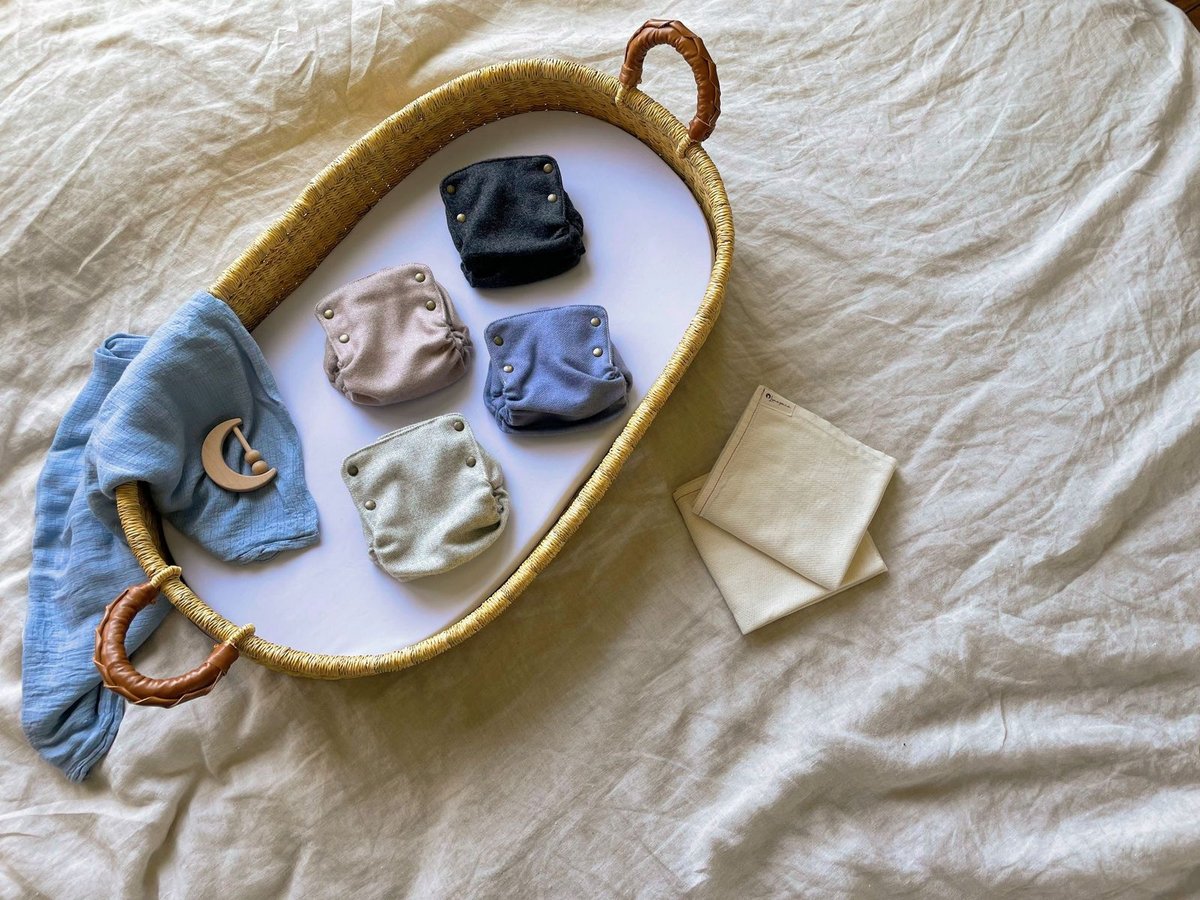Simple Laundry

Alpaca + Cotton: the simplest wash routine for cloth diapers.
Single-layer Cotton Flats are the easiest reusable diapers to clean and the fastest to dry. And, if you use Alpaca Covers, you won't have plastic in the laundry trying to "waterproof" dirty diapers from clean water. Moreover, alpaca can be washed infrequently, dries faster than wool, and doesn't need to be "lanolized" to work!
How to Wash Alpaca
Wash every 2-3 weeks
Alpaca has antimicrobial properties which prevents odor-causing bacteria from growing. It should not have a smell when it is dry. If it does, it's time for a wash.
If poop gets on the cover you'll need to wash right away. Click here for tips for keeping poop off the cover and going longer between washes.
1. Soap + Water
Fill a sink or small bowl with cool water. Add a gentle soap. We prefer SOAK but baby soap will also work! Just a capful will do. It's like a tiny bubbly bath for your alpaca.
2. Soak
Pre-treat any stains by applying soap directly to them.
Add your alpaca to the tiny bath, pushing the water through the cover a few times. Then let it soak for about 15 minutes.
3. Rinse, Roll, Dry
Rinse with cool water. Gently squeeze (don't wring!) out the water then roll it up in a towel (or a cotton flat) to help speed up drying. Lay flat or hang to dry.
How to Wash Cotton Flats + Wipes

1. Remove Solids
Pee diapers can just be rolled up and tossed in the laundry. Here are some tips for the other kind...
Pre-solids: If your baby hasn't started solids yet, great news! These diapers can also go directly in the wash. Seriously. Breastmilk and formula are water-soluble and will easily wash out. If something looks more "solid", just dump whatever you can in the potty first.
After solids: Once your baby starts solids, start plopping those poops into the potty. If it's not easily "plop-able", you can use toilet paper or our wooden Wipe-Away Wand to wipe anything "3D" into the toilet. Don't worry, streaks will also wash out. Alternatively, you can also use a handheld bidet / diaper sprayer to remove solids.
Spraying is especially helpful if you don't plan on washing daily. When waiting between wash loads, we recommend storing soiled flats in an open laundry basket (yes, really! It's a counter intuitive way to reduce smells, but it allows for better ventilation). Just be sure to allow cotton to air dry before storing.
2. Wash (every 1-2 days)
Machine wash warm on "heavy duty" or your longest wash cycle. Some prefer to add a warm pre-wash or quick wash cycle before the main wash. Be sure your machine is 1/2 to 3/4 full for proper agitation (this is actually true for all laundry!).
Use any commercial laundry detergent and use the recommended amount for your load size. Avoid bleach except in cases of illness or to sanitize pre-loved items.
Washing every 1-2 days makes it easier to clean. If you want to wash less frequently, we recommend rinsing with water and letting air dry between washes, like in a mesh laundry bag!
TIPS: Avoid optical brighteners, fabric softeners, and fragrance as these bind to fabric and may cause repelling and/or rashes. If you prefer to use fabric softener, we recommend a cloth-safe, unscented one like Unicorn Beyond Soft (or vinegar if your machine allows it).
3. Dry
Our Organic Cotton Flats, Hemp Boosters, and Cotton Wipes can all go in the dryer. No dryer sheets as these can leave a residue, consider wool dryer balls instead!
Also, our Cotton Flats + Cotton Wipes dry after just 10-15 minutes in the dryer but they also dry quickly on the line. Hemp boosters take a bit longer to dry.
TIP: Low heat or line drying are not only great ways to reduce your energy bill and environmental impact, it will extend the life of all your garments.



